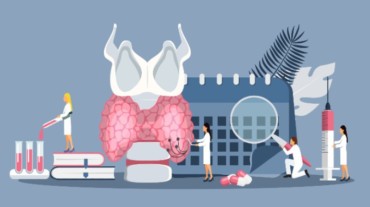
Did you know that in 2017, close to 45 million Indians were suffering from an anxiety disorder? Anxiety can severely impact our quality of life and ability to work and socialise. And while we know just what anxiety can do to our body, here’s something that is still being studied: just what causes anxiety? The answer ranges anywhere between stressful and/or traumatic events, genetics, and hormonal disorders like thyroid. Yes, thyroid can be a factor behind psychiatric disorders such as anxiety.
According to a study being presented at e-ECE 2020, people with anxiety may also have inflammation in their thyroid gland. These findings suggest that thyroid function may play an important role in the development of anxiety disorders and that thyroid inflammation should be investigated as an underlying factor in psychiatric disorders.
Also, watch: On World Thyroid Day, watch out for these 7 signs of a thyroid disorder
The study found that people with autoimmune inflammation of the thyroid may be at greater risk of developing anxiety. But current examinations for anxiety disorders usually focus on the dysfunction of the nervous system and do not take into account the role of the endocrine system.
How can thyroid dysfunctioning cause an anxiety disorder?
The thyroid gland produces the hormones thyroxine (T4) and triiodothyronine (T3) that are essential for regulating heart, muscle and digestive function, brain development and bone maintenance. Autoimmune inflammation in the thyroid occurs when our bodies wrongly produce antibodies that attack the gland and cause damage.

Dr Juliya Onofriichuk from Kyiv City Clinical Hospital investigated thyroid function in 29 men and 27 women around the age of 30 who were diagnosed with anxiety and were experiencing panic attacks.
She studied the ultrasounds of the participants’ thyroid glands to assess thyroid function. Their blood levels of thyroid hormones were also measured. The patients with anxiety showed signs of inflammation of their thyroid glands but their function was not affected, with thyroid hormone levels all within the normal range, although slightly elevated. They also tested positive for antibodies directed against the thyroid. Treatment for 14 days with ibuprofen and thyroxine reduced thyroid inflammation, normalised thyroid hormone levels and reduced their anxiety scores.
“These findings indicate that the endocrine system may play an important role in anxiety. Doctors should also consider the thyroid gland and the rest of the endocrine system, as well as the nervous system when examining patients with anxiety,” Dr Onofriichuk explained.
The further research will examine the levels of thyroid, sex and adrenal hormones (cortisol, progesterone, prolactin, oestrogen and testosterone) in patients with dysfunctional thyroid glands and anxiety disorders. This research aims to help understand more clearly the role of the endocrine system in the development of anxiety and could lead to better management of anxiety disorders.
Select Topics of your interest and let us customize your feed.
PERSONALISE NOW